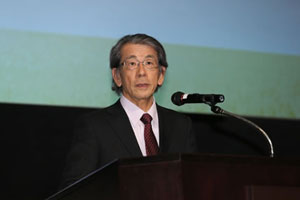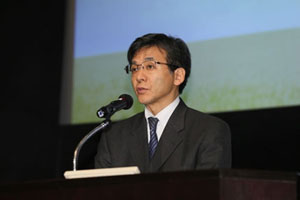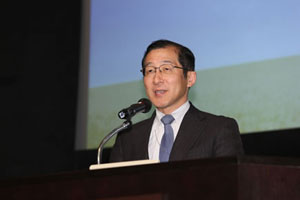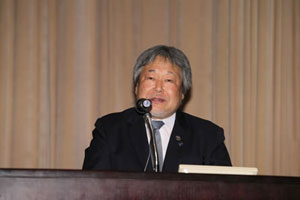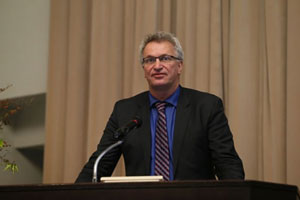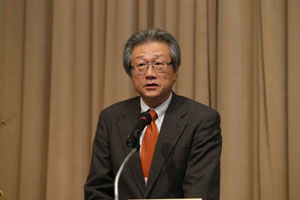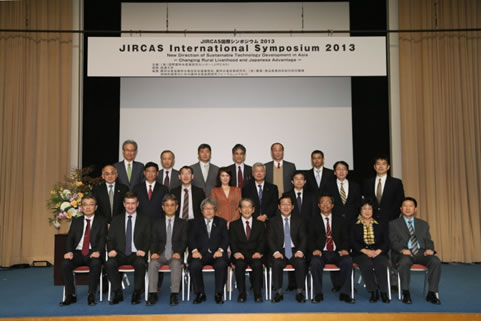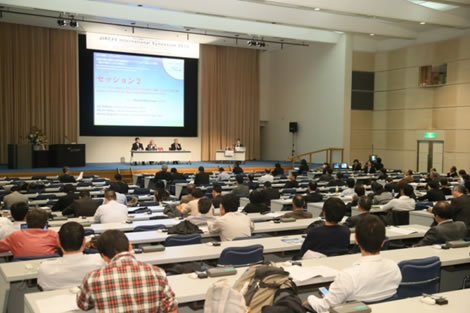- Date
- November 20-21, 2013
- Venue
- U Thant Hall, United Nations University, Tokyo, Japan
- Organizer
- Japan International Research Center for Agricultural Sciences (JIRCAS)
- Co-sponsored by
- United Nations University (UNU)
- Under the auspices of
- Agriculture, Forestry and Fisheries Research Council (AFFRC) Secretariat, MAFF
- Policy Research Institute, MAFF (PRIMAFF)
- National Agriculture and Food Research Organization (NARO)
- Japan Forum on International Agricultural Research for Sustainable Development (J-FARD)
Summary
- Keynote Speakers
- Hiroyuki Konuma
(Assistant Director-General and Regional Representative for Asia and the Pacific, FAO) - Special Speech
- Martin C. Th. Scholten (Wageningen University, the Netherlands)
- Session Chairs
- Osamu Koyama (JIRCAS), Masuo Ando (JIRCAS), Ryoichi Matsunaga (JIRCAS), Masayoshi Saito (JIRCAS), Kazuhiko Nakahara (JIRCAS), Kazumi Yamaoka (JIRCAS)
- Speakers & Panelists
- Linkham Douangsavanh(NAFRI, Lao PDR)
- Yingheng Zhou (Nanjing Agricultural University, China)
- Seiichi Sakurai (Chiba University, Japan)
- Joji Arihara (Kubota Corporation, Japan)
- Hitoshi Kanno (Tohoku University. Japan)
- Akinori Noguchi (Ishikawa Prefectural University, Japan)
- Isao Tsutsui (JIRCAS)
- Iwao Noda (JIRCAS)
- Othman Sulaiman(USM, Malaysia)
- Akihiko Kosugi (JIRCAS)
- Robert J. Holmer(AVRDC)
- Warunee Varanyanond(Kasetsart University, Thailand)
- Masahiro Shoji (Morinaga Institute of Biological Sciences, Inc., Japan)
- Kazuhiko Nakahara (JIRCAS)
Martin C. Th. Scholten (Wageningen University, the Netherlands) - Yasuo Watanabe (Policy Research Institute, MAFF, Japan)
Tokio Imbe (NARO, Japan)
Masa Iwanaga (JIRCAS)
Proceedings Overview
Dr. Masa Iwanaga, President of JIRCAS, opened the symposium. He spoke of focusing on the utilization of Japan’s advanced technology to contribute to rural livelihood development in Asia in response to the challenges posed by globalization. He also expressed optimism that the symposium will provide an opportunity to exchange opinions, share research outcomes, and help define the future directions of agricultural research activities.
Mr. Hirotsugu Amamiya, Director-General of the AFFRC Secretariat, MAFF, and Mr. Akira Nagata, Senior Programme Coordinator of the UNU, welcomed the participants. Mr. Amamiya emphasized the significance of research and development and the need to strengthen close relations at home and abroad for the sustainable development of agriculture, forestry and fisheries. Mr. Nagata, in addition, expressed his expectations that sharing the results of research activities will lead toward sustainable development of agriculture, forestry and fisheries as well as other related industries.
A keynote speech titled “Outlook of Global and Regional Food Security, and its Impact to Japan” was delivered by Mr. Hiroyuki Konuma, Assistant Director-General and Regional Representative for Asia and the Pacific, FAO. He gave a lecture on current and future trends in food security in Asia and the world, and pointed out issues that need to be tackled by Japan in order to promote and attain food security.
Afterwards, a slideshow titled “20 years of JIRCAS” was presented, highlighting JIRCAS’s milestones over the past two decades.
Researchers and experts from various organizations shared their experiences and opinions during the four thematic sessions that followed.
In Session 1, "Changes in Food Demand and Corresponding Technologies," food security related to market-oriented and future direction of agriculture in Lao PDR, Chinese food consumption trends and the direction of food technology development, and trend of food consumption, marketing and technological development in Japan were discussed.
In Session 2, "Japanese Potential for New Technology Demand in Asia," advanced technologies on rice mechanization, use of controlled-release fertilizers for sustainable crop production, and novel food technologies for better quality and value addition were presented.
In Session 3, "Sustainable Rural Income Sources," the first two topics were on JIRCAS projects in Thailand, focusing on mixed farming of giant tiger prawns and unutilized benthos as well as teak timber production. Also discussed were biomass utilization of waste oil palm (by USM, Malaysia) and sustainable agricultural production by biomass utilization technology (also a JIRCAS project).
In Session 4, "Food Technology Network in Asia,” the AVRDC discussed a nutrition-sensitive food system intervention model; Kasetsart University explained Thai food culture and the benefits of fostering a food culture policy; Morinaga Institute of Biological Science, Inc. introduced a food allergen analysis and management technology; and JIRCAS described the establishment of the regional food resource network.
The panel discussion, themed “Strengthening Japanese Agricultural Competitiveness through Collaboration with Asia,” was preceded by a special speech by Dr. Martin C. Th. Scholten of Wageningen University, the Netherlands. His lecture, titled “Feeding the World within the Carrying Capacity of Planet Earth: the Netherlands approach in smart agrifood business,” cited the reasons for the success of agribusiness and agricultural research in the Netherlands.
During panel discussion, the six panelists expressed their ideas on improving Japan’s competitiveness. The discussion was concluded by acknowledging the importance of pursuing technological developments based on careful analysis of the current situation, and together with the international network, to review the role of Japan and examine how the country could benefit and make further contributions.

